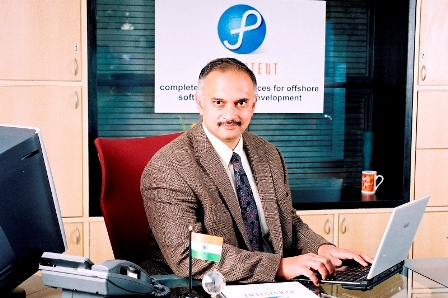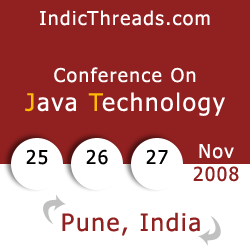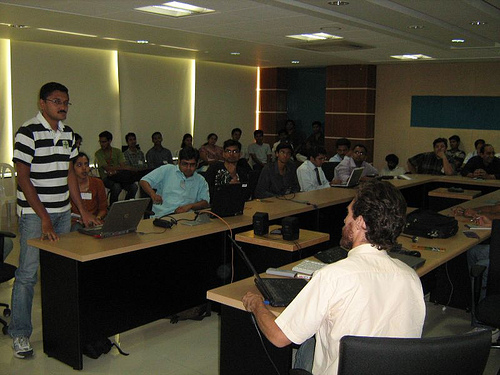Update: Ask PuneTech is being replaced by ForPune.com, a site that is much better suited to answer questions you might have about Pune. Please ask a question there, and we (PuneTech and the rest of the tech community in Pune) will monitor that site and try to get an answer for you. To ensure that the right people read your question, please make sure to tag your question “punetech” so that it gets read by the right people.
The rest of this page is kept for historical purposes, but we prefer that you use ForPune.com instead of the mechanisms described below.
 Quick Summary for those too lazy to read the whole page: Ask PuneTech is a One-Stop Shop for all the information needed by infotech professionals and infotech startups in Pune. Ask us a question, or for a referral, or for some information and we find it for you, or we will put you in touch with person who has previous experience in that area to guide you. Just send an email to ask@punetech.com.
Quick Summary for those too lazy to read the whole page: Ask PuneTech is a One-Stop Shop for all the information needed by infotech professionals and infotech startups in Pune. Ask us a question, or for a referral, or for some information and we find it for you, or we will put you in touch with person who has previous experience in that area to guide you. Just send an email to ask@punetech.com.
Details: PuneTech has been running for 8 months now, and it has been very successful in filling the information gap that existed in the tech ecosystem in Pune. The PuneTech blog reaches about 700 people on a daily basis. The PuneTech wiki is slowly adding more and more useful data (see, for example, the page on tech user groups and organizations in Pune). The PuneTech calendar has become the most comprehensive source of information about tech events in the city.
However, one of the more unexpected ways in which we are helping people is in finding answers to our readers’ questions, or connecting them to the right people. In doing this, we have realized that there is a a need of a service where people who are facing some problem need to be connected with someone who has solved that problem in the past. The internet and google are supposed to solve this problem, but it doesn’t work that way. The web is not particularly useful if you are looking for specific, local information (like, who is a good CA for STPI registration). And sometimes the problem complicated and you need to talk to a human who can guide you. We noticed that we have been doing more and more of that in recent times, and we decided to formalize the concept and announce it. Thus was born the “Ask PuneTech” service.
Through PuneTech, we now know enough experienced people in the field of infotech that for any question you might have as a techie in Pune, or an infotech startup in Pune, we can connect you to the right person who can help you. More importantly, we know enough people who would happily help others like this for free – just for the satisfaction of preventing others from going through the same pain that they went through. So send the question to ask@punetech.com and we’ll get back to you with the answer.
This is a free service, but if you ask a question, you need to promise that when you get a solution to you problem, you will write it up in an article and send it to us for publishing on the PuneTech wiki for the benefit of all the others in the future. This way, the knowledgebase will continue to grow.
The rest of this page has more details in a Q&A format to make you think that you are talking to yourself:
Q: How does it work?
A: If you are a techie in Pune, or a Pune-based info tech startup, and you have some question or difficulty send us the question at ask@punetech.com. If we already know the answer (i.e. someone has asked that question before) you’ll get the answer right away. If not, we’ll tap our network of volunteer experts, and try to get the answer for you. Or, we’ll put you in touch with a person who we believe will be able to guide you appropriately, and whose judgment we have some confidence in. We’ll provide you with of the source of the information, and our confidence in the validity of the information, and/or our confidence in the reputation of the source.
This will be a completely free service, but there is one rule you have to follow: If you find a good enough solution to your problem (and assuming that the question / answer happens to be of general interest), you must write it up and send it to us so that we can post it to the PuneTech wiki for the benefit of the rest of the world. You must promise us this as a “payment” for using our service.
Sample questions:
1. Can you suggest a good consultant / service provider for the following:
a. Accounting
b. Company registration
c. STPI registration
d. Branding / marketing
e. Design (logo, website)
f. Intellectual property (copyright, trademarks, patents)
g. Legal questions (cyber law, privacy)
h. Facilities (rental accommodation, furniture, etc.)
2. Can you suggest a good free / paid service for
a. Web hosting
b. Broadband internet
c. Website development
d. Search Engine Optimization
3. Where can I find a Ph.D. in statistics / maths / data-mining in Pune to help me with xyz
4.
Warning: Ask PuneTech is not intended to be a jobs board. Do not post about open positions you might have. Do not advertise yourself as a candidate. Such requests will be summarily deleted. Requests for persons with specific skills will be entertained only if the skills required are very specific (e.g. good: looking for help with Erlang; bad: looking for Java expert) and for a short consultation (e.g. good: need help with installing SuSE on a Dell laptop, bad: need a QA person).
Q: How much do you charge for this?
A: This is a free service. We are a group of volunteers doing this because we really want the tech ecosystem in Pune to improve, become more vital, become more active, and in general increase the productivity of Pune’s techies. We personally benefit from this indirectly: vastly improved networking, increase in visibility, increase in exposure, having a finger on the pulse of Pune, and the undying gratitude of some of the smartest people in Pune.
Q: Do you take money from services/experts whom you are recommending?
No. PuneTech and “Ask PuneTech” are community-driven, non-commercial services that do not accept any money from any source for any purpose whatsoever. Services/sources will be recommended purely on the basis of quality of service provided.
Q: Why not create a wiki for this and be done? Why is this service needed?
A: We tried and it doesn’t work. For some reason, people don’t add content to a wiki. There isn’t enough critical mass, and/or visibility for this to work. So, to tackle that problem, we are trying this, where we manually connect the “askers” to the “askees”, and “force” the “askers” to update the wiki after the question has been answered.
Q: Why not have an open mailing list where anybody can post questions and answers?
A: One problem is that there are many people who are not aware of the appropriate mailing list or website or forum where the question can be asked. In such cases, the Ask PuneTech service will simply point you towards the appropriate forum where you should ask your question. And in case, the question doesn’t get answered there, then we try to find an actual person to answer the question for you.
That brings us to the second problem: Sometimes posting to a mailing list works, but often it doesn’t. In other cases, there are many questions which do not get answers on the mailing list, in spite of the fact that the list does contain members who know the answers. It is often the case that the person who knows the answer would be happy to guide you if you called him up on the phone, but doesn’t have the time to type out the answer in email (or doesn’t read the mailing list so closely.) We are hoping to overcome this problem by introducing a personal touch.
Where possible, we will redirect you to an appropriate mailing list. e.g. if you have problems with connecting to BSNL broadband from your Ubuntu system, we’ll send you to the PLUG mailing list.
Q: How do you keep tabs on the quality / reliability of the information you provide?
A: We intend to tackle this in two ways. First, for all the suggestions you get, we’ll provide you with of the source of the information, and our confidence in the validity of the information, and/or our confidence in the reputation of the source. Hopefully this will be enough for you to take a slightly more informed decision. We feel that this will be better than having no information at all.
Second, over time, we intend to build a database of information sources and our confidence in the accuracy of their information. After we suggest something to someone, we expect them to provide us feedback as to how well it worked out. We’ll collate this information over time so that the quality of the information improves.
Q: Why are you doing this manually? Shouldn’t you use technology / wisdom of the crowds / automation to do this more efficiently?
OR
Q: Is this the same as Yahoo!Answers / LinkedIn Answers / xyz Forums / CraigsList?
A: We believe that technological / wisdom-of-the-crowds solutions only work at a large scale (like Wikipedia / Yahoo!Answers). It does not work at a smaller scale (like Pune). Otherwise, a viable technology solution would have emerged by now. The lack of that has forced us to try this out.
That said, we definitely intend to use leverage technology as much as possible in this endeavor. We just feel that initially this has to be done manually until it gathers enough of a critical mass.
Also, if you feel that a technology solution will beat this, we would encourage you to try. This is one argument we’d love to lose. We don’t care whether our approach wins or some other approach. We just want a solution to the problem of lack of reliable information.
Q: If this is free, it is not sustainable! This service will shut down after 6 months!
A: We have been doing http://punetech.com as a free service for almost an year now, and we have a pretty good feel for what is sustainable and what isn’t. In any case, we’ll worry about sustainability a little later. For now we are focusing on proving that there is a need, and people will use a service like this, and it will be useful. (We are convinced of that, but we need to prove it.) Once that has been proved, we can worry about how to sustain it.
Q: Since this is volunteer driven, it is not scalable!
A: See answer to previous question.
Q: How can I help?
A:
- Start using the service. The more people use it, the more useful the service becomes (and the knowledgebase grows)
- Make yourself available to us as an expert who can provide the answer (in whatever happens to be your area of expertise). We promise to not bother you too much. We’ll only forward you as many questions are you are willing to handle. If we don’t know you, we’ll initially put you down as an “untrusted source” and over time, your designation will (hopefully!) change to “reliable”.
- Tell all your friends about this service. (Actually, while you are at it, also tell your friends to subscribe to PuneTech at http://punetech.com/subscribe/ to get information about all the latest news, events, tech groups, startups and technologies in Pune.
Q: Who is behind this service?
A: The questions asked to “Ask PuneTech” are answered by a network of volunteers across Pune, who all share a passion for technology, or a passion for Pune, or, in most cases, both.
The service is coordinated by the people who run PuneTech, the most comprehensive source of information about technology in Pune (if you find a better source please let us know!) It was started by Navin Kabra. Amit Paranjape is a key advisor and evangelist for PuneTech, and one of the top volunteers. Another special mention goes to the Pune OpenCoffee Club, which has a close symbiotic relationship with PuneTech. There are a number of other people, too numerous to mention, who contribute in varying degrees.
Both, PuneTech and “Ask PuneTech” are intended to be community-driven, non-commercial services. To ensure that the content remains free from bias and vested interests, we do not accept any money from any source for any purpose whatsoever.
 Anand Deshpande, CEO of Persistent, gave this keynote address last week during the IndicThreads conference on Java technologies. I’ve already included this in my overall report on the IndicThreads Conference, but thought that it was interesting enough and important enough to warrant a post on its own. The basic thrust of his talk was that often, programmers just think about their programs and disregard what is going on in the industry outside. Having this perspective is important, and keeping track of important industry trends will improve you technically. The top trends he identified are:
Anand Deshpande, CEO of Persistent, gave this keynote address last week during the IndicThreads conference on Java technologies. I’ve already included this in my overall report on the IndicThreads Conference, but thought that it was interesting enough and important enough to warrant a post on its own. The basic thrust of his talk was that often, programmers just think about their programs and disregard what is going on in the industry outside. Having this perspective is important, and keeping track of important industry trends will improve you technically. The top trends he identified are:






